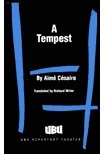Well. This was a total waste of my time. I get it, it's making a point to the reader. But what a way to pervert an old play and make it something nothing like the original! I get it. It's emphasizing the theme of colonization. But REALLY. *Facepalms* I found nothing amusing about this re-interpretation of Shakespeare's The Tempest at all. As far as I'm concerned, Cesaire is another one of those jackass political-message driven guys who decided that his greatest gift to the world would be to write crap like this to prove a point.
Point made. I'm about ready to toss this book in the trash. It's not worth a scratch or even an itch.
First off, the man has some grand lines--and they're all given to Caliban. Every other character is so stereotypically one-sided that it's clear he was using them only as representations of what he saw in colonizers, white men, and so on. Again: got it, Cesaire. Also: don't really give a rip! The writing was plain, the poetry was rot, the man has no sense of continuity--if you hadn't read Shakespeare's original, The Tempest, you'd be more than a little lost with the transitions (or should I say, lack thereof) he makes. It was just a mess. An ugly piece of writing in quality, not even based on the subject. But God, the stereotyping, the concentration on nothing but getting a single flippin' point across! GAH! This is why I don't enjoy most English programs! Whatever you read has always got a MESSAGE. And I'm sick of it.
If Cesaire had written something well, without this speedy and careless tone and manner of piecing words together throughout the "play," then perhaps it would have carried its point better! But even if it had been written "well," the entire POINT was to write the play BADLY so that every single crude stereotype showed up harshly and blatantly apparent. GEEZ it's annoying reading works like this! Making fun of The Tempest? Fine. I can live with that. Writing badly to prove a political point? Just shorts out whatever patience I have.
This book, quite frankly, can be burned and I wouldn't bat an eyelash. I'd probably scowl and walk away after watching it disintegrate. It's so short, and so easy to read, but really. Why bother? If you want to read something more complex, go to Shakespeare's actual play. It's much more fun to analyze and pick apart the characters there.
OH. And speaking of the CHARACTERS! I don't appreciate how Cesaire played with their personalities. You want to emphasize how stupid Stephano and Trinculo are even more? Fine, go ahead. They were like that before. You want to make Gonzalo seem like a dolt because he's the sole optimist in the bunch? I can live with that. But where do you come off taking Prospero--who in the original Tempest, didn't even take Caliban seriously when he narrowly escaped being caught and killed by him--and making him into this blatant wuss of a character, more weak than Trinculo and Stephano are greedy, bumbling idiots? And on top of that! Okay, play up Caliban's character! Make him the hero of this story! That's fine! It's usually really amazing when you get to read the same story from a completely different character's point of view! I love stories like that! And you did a GREAT job of making Caliban regal and noble, tough and strong. He was a GOOD hero character. ...but he had too many holes. He contradicted himself a couple of times. He refused to take into consideration any other path but his own. And, what the heck, really? Do we have to bring in being a "black slave" into this? *Rolls eyes* Come on. Drop it. It's over. If people stopped constantly talking about it, then we wouldn't be having PROBLEMS with this stuff! Sheesh. Also: Ariel. ...what... did you do... to my FAVORITE character?! Why is Ariel so "Let's all be FRIENDS, guys! 8D" and crap?! In the original, he was a character that was distant from everyone, with a conscience and a brain; he did what he had to do for himself, and he was mysterious, cool, collected! He's just another wishful (and the reader is made to think: pathetic) "slave" who obeys his "master," hoping (apparently uselessly) to be someday rewarded with his freedom. ...COME ON! In the original he was more an ALLY to Prospero, standing on the same ground as him, than a slave! GAH. Sure he obeyed Prospero because of his indebtedness to him! But the magical Ariel also stood on the same ground, with powers on the same level as Prospero's! They were EQUALS and Ariel was far more capable and competent in the original! DX< Gah! I hate it when people mess with characters that I love!
So I ranted there for a bit. But it's just ticked me off. I don't mind parodies. And I certainly don't mind getting a different view of things on the same subject. But my biggest peeve was that I couldn't enjoy the story, or the characters, because all I kept getting out of it was the POLITICS. And as much as I might know a thing or two about politics, I don't want to have it shoved down my throat! D8< ESPECIALLY when I'm reading someone's "MESSAGE" at the price of the ruin of an entertaining story and some pretty dang fun characters too! -3- If you want to, pick it up. But it's substandard writing, and I'm not even talking message-wise. Just writing-wise it's poor work. You want to give it a go? Sure. Take a whirl. But I'll be surprised if you enjoy it. There's very little in it to be either entertained by, learn from, or care about. It's just there, wasting my time and bookshelf space! And on that note, review is finished! On to something better (I hope)!

